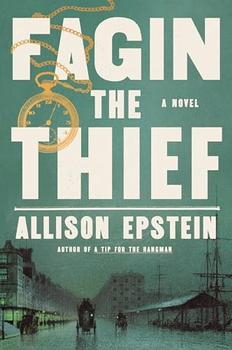Summary | Excerpt | Reviews | Beyond the Book | Readalikes | Genres & Themes | Author Bio

A Novel
by Allison Epstein
"Next job. Says there's nothing like a boy for getting into and out of tight spots. The house he's after, it's near twenty miles out in Chertsey, half a day's journey just to case it, and you know the owner has dogs and servants who aren't afraid to shoot. Almost makes me wonder whether he's trying to get caught."
She isn't saying it, but Jacob knows what she's thinking. If Bill goes down, he's taking everyone within arm's reach down with him. And no one these past twenty-five years has been closer to Bill Sikes than Jacob has.
"He's met Charley before, hasn't he?" he says finally.
Nan laughs, surprised into it. "You know one boy's the same as another to him. He doesn't know Charley will run off chasing a butterfly halfway through the job. But you tell him that and he'll only make you find him another."
He nods, but he's hardly listening anymore. The black eye Nan came to see him with last week is nearly gone now, though she keeps her sleeves pulled down almost to her first knuckle, and he's known Bill and Nan long enough to suspect what that's meant to hide. He's tried to voice that concern more than once, only to be dismissed each time with the same grim laugh and the same "You're one to talk, Fagin." Granted, he is one to talk. But that's why he knows he's right.
A person who was properly afraid of Bill would not be in Jacob's situation, would not be the one Nan comes to in times of crisis. He's not Bill's keeper, is not Bill's friend, is not Bill's father. Every time he tries to think of what Bill is to him and he to Bill, he is made aware anew of the vast holes in the English language, the voids into which the men society casts off can slip, and where they must form categories and semantics of their own. He is Bill's, and Bill is his, and no dictionary in the country can put the matter more precisely.
"I'll talk to him," he says. "About all of it, not just Charley. I know how he gets better than anyone."
"Anyone but me," Nan says, her chin lifted.
"Anyone but you," he concedes. "You have my word. I'll talk to him."
Nan laughs. "Your word? Damn my eyes, what is your word good for?"
He sips the tea, grimacing—the tea leaves may be fresh, but they are not good, and at the moment he lacks so much as a splash of milk to make them more palatable. "More than you'd think, in some circles. He's at the Cripples?"
"Will be. Still asleep when I left him. He didn't come back until past three last night. The dog turned up without him, and for two hours I thought the traps had pinched him."
"Not Bill," Jacob says. "Not like that, in dark of night. If they ever take Bill again, I promise you, the whole of London will know about it as it happens."
Nan seems prepared to remark that this is a singularly cold form of comfort when the door thumps open again, and two sets of footsteps rattle down the passage. Both Nan and Jacob fall silent, listening. Their two visitors are clearly of opposite temperaments. One swaggers in with great clomping steps, as if a brass band appeared to herald their entrance. The other—so quiet that less-attuned ears than Jacob's and Nan's might not even hear them—creeps with an air of apology.
He nods to Nan. "Not to worry," he says. He knows what such footsteps signify. He's been here many times before.
Sure enough, Jack Dawkins bursts into the room with his hat under one arm, a grin stretching the sides of his thin face. The boy looks as if he got into a fight with a penned-up swine and came off decidedly the worse: mud and dust cling to the hem of his coat, and a smear of dirt swipes across his cheek and chin in a way that puts Jacob in mind of a gentleman's sideburns. There is, of course, nothing gentlemanly about the self-styled Artful Dodger, despite the elaborate bow he gives to introduce his companion.
The owner of the apologetic footsteps is a boy of indeterminate age, somewhere between six and twelve. A workhouse boy, Jacob would bet his life on it. Children stumble out of such institutions simultaneously too small to walk the streets on their own and too old to laugh or shout or smile. The boy, whatever age he might be, is fair-haired and fine-featured, and his wide blue eyes dart across the room, taking in the seemingly random furnishings. He lingers on the clothes-horse bedecked with pocket-handkerchiefs before proceeding to the three sausages still left in the pan, which catch his attention and keep it.
Excerpted from Fagin the Thief by Allison Epstein. Copyright © 2025 by Allison Epstein. Excerpted by permission of Doubleday. All rights reserved. No part of this excerpt may be reproduced or reprinted without permission in writing from the publisher.
Harvard is the storehouse of knowledge because the freshmen bring so much in and the graduates take so little out.
Click Here to find out who said this, as well as discovering other famous literary quotes!
Your guide toexceptional books
BookBrowse seeks out and recommends the best in contemporary fiction and nonfiction—books that not only engage and entertain but also deepen our understanding of ourselves and the world around us.